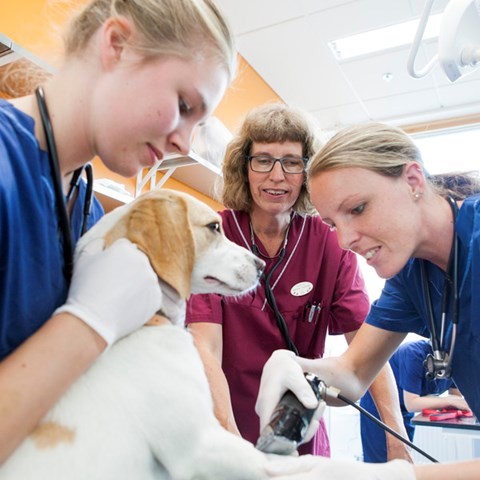Facts:
The Veterinary Medicine programme was last evaluated in 2024 and 2025. The evaluation reports and the final decisions are available here.

Every seven years, our Veterinary Medicine programme undergoes evaluation to maintain our European accreditation. An evaluation process is ongoing.
Our Veterinary Medicine programme is accredited following the standards set by the European Association of Establishments for Veterinary Education (EAEVE). The standard is based on minimum requirements stipulated by the European Union.
Accreditation is a sign of our programme’s quality and enables our graduates to practise and continue their professional development in a competitive market anywhere in Europe. Accreditation also provides us with the possibility of offering specialist European programmes approved by the European Board of Veterinary Specialisation (EBVS).
EAEVE follows an evaluation system to ensure the following:
The formal decision to grant our veterinary education programme European accreditation has now been made by the European Committee of Veterinary Education (ECOVE).
The next evaluation (Full Visitation) for continued accreditation will take place in autumn 2030.
On 7th August 2024 we received the happy news that our veterinary program is accredited by The Australasian Veterinary Boards Council (AVBC). This accreditation means that veterinarians trained with us, who graduate from 2024 onwards, are eligible for authorisation to work in Australia and New Zealand.
The accreditation is valid for 7 years, after which a new evaluation will be carried out.
Accreditation is a sign of our programme’s quality. It enables our graduates to practise and continue their professional development in a competitive market anywhere in Europe.
Accreditation also provides us with the possibility of offering specialist European programmes approved by the European Board of Veterinary Specialisation (EBVS). The specialist programmes are divided into a one-year internship and three-year residency. You can read more on Specialist Education – EBVS - European Board of Veterinary Specialists.
Hypothetically, SLU could provide a veterinary program without being EAEVE accredited, as long as we are authorized by the Swedish Board of Agriculture. However, this is not an option. We need to be EAEVE accredited to be able to offer European specialist programs approved by the European Board of Veterinary Specialisation (EBVS).
The veterinary programme accreditation process follows clear process with compulsory components stipulated in the standard operating procedure (SOP) which is summarised below.
Request for full visitation – The institution must first apply to be evaluated. In December 2022, SLU applied to undergo evaluation for continued accreditation.
Self-evaluation report (SER) – The institution will then self-evaluate and summarise this in a report. You can find SLU's Self-Evaluation Report (SER) a bit further down in the information box.
Full visitation – An evaluation team, appointed by EAEVE, visits the institution to evaluate the education on-site. This should be carried out when the educational activities are in full swing, meaning when most staff and students are present.
Visitation report – After the visit, the delegation writes a report, which includes recommendations among other things. Within 14 days after the evaluation is completed, we have the opportunity to read the report and correct any factual errors.
ECOVE decision – The European Committee of Veterinary Education (ECOVE) then meets and decides on the accreditation, based on the institution's self evaluation and the recommendations of the evaluation team's report. If they find that the institution has one or more major deficiencies, the institution is given the status of Pending Accreditation. If the institution is found to comply with the standard, it is given the status of Accredited. Decisions are communicated within two days of the meeting.
Re-visitation – In case of Pending Accreditation status, a re-visitation shall be arranged, to evaluate whether the deficiencies have been corrected. ECOVE then makes a new decision. This must take place within two years after the Full Visitation.
While the major deficiencies are being addressed, the programme remains accredited. The pending accreditation status does not affect the students' ability to work in the EU and the UK, nor does it affect their chances of being admitted to specialist programs (Diplomates).
If the veterinary education establishment chooses not to rectify the shortcomings, or if we do not follow the regulations for re-visitation, they will automatically be allocated the ‘non-accredited’ status.
The Veterinary Medicine programme was last evaluated in 2024 and 2025. The evaluation reports and the final decisions are available here.
You can send any questions you may have about the accreditation process to internkommunikation@slu.se. The FAQ will be updated as necessary.